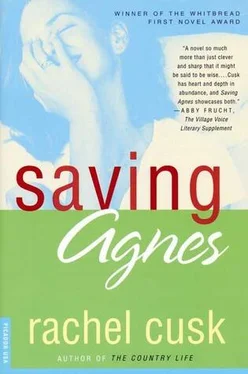They whiled away afternoons in art galleries or parks, evenings in bars and restaurants. Often he would arrive late, making her wait for an hour or more. At first she wondered if he was putting her devotion to the test and she sympathised with his uncertainty accordingly; but he always seemed mildly surprised to see her there waiting, as if they had met by coincidence. On Saturdays they would go back to her house — always her house; his, which she had never seen, was somewhere in south London. The next morning he would return there without delay, mysterious and alone like an alien to its planet. Later she would try to find evidence that he had been in her room, and was often surprised to discover she couldn’t even remember anything he had said. She thought about John frequently and realised she could recall almost every word he had ever spoken to her. The less conventional order in which they had done things — restaurants for breakfast, the park at night — sometimes interfaced in her mind with the current course of events like a shadow. She did not entertain such recollections in the spirit of comparison: they floated disembodied and glittering like stars above the wheel of her fortune, detached recollections of a thing met by chance, like a banknote found in a gutter.
‘I feel as if I’m in control of a relationship for the first time,’ she told Nina.
Stay with me, she had said one night; a Wednesday night when he had come in but then seemed inclined to leave. Don’t leave me on my own. To her amazement he had stayed, as if he didn’t care what he did, and had slept beside her all night. John would never have done that. If John had wanted to leave Agnes could have slit her wrists and it wouldn’t have stopped him. She had felt almost uncomfortable with his obedience and had slept little that night, unable to enjoy a thing so devoid of the pleasure of his desire, so single-handedly orchestrated by herself. His presence felt like a loan rather than a gift.
‘I mean,’ she said, ‘it’s what men have been getting for years, isn’t it? Passivity, obedience, servitude.’
‘Right.’ Nina didn’t look so sure.
‘Well, maybe he’s the ideal feminist man, then.’
It had come to the point where she almost felt like she was using him, for, try as she might to force upon him the gift of her affection, he did not seem to want it. She supposed they were having an affair, a tiny, delectable confection. The thought that she might love him, might try and live off his unnourishing presence, almost amounted to a social gaffe. It would be like falling in love with a kitchen appliance. She laughed nervously, thinking of something.
‘He’s a bimbo!’ she cried.
Nina lit a cigarette and stared into the middle distance.
The first time he had come back to her house they had sat on her bed reading the next day’s papers, bought in advance in Leicester Square. Wishing she could procure more immediate aspects of tomorrow’s news with such ease, Agnes feigned deep involvement with a leader on the Middle East crisis while trying to deal with a crisis of her own. Why wasn’t he doing anything? If he didn’t want to make use of the strategic location she had offered him, why was he here? She shifted on the bed portentously and yawned, but even with all her defences down he seemed unwilling to attack. Initiation had never been one of Agnes’s strong points, and its meaning for her was double-pronged. A rare moment of identification with the male sex, strangely unrelated to the envoy beside her, came upon her as she launched into a long and rambling monologue about how many things she had to do in the morning, followed by a clumsy sort of half-hug, and found it had not been the conflagratory spark to his tinder she had hoped for. He seemed willing enough to respond in kind, but his simple mirroring of her actions reminded her uncomfortably of an annoying game her brother Tom used to play when they were children.
‘Mum, he’s copying me!’ she would cry, running to find her mother.
‘Mum, he’s copying me!’ Tom would echo, running and laughing behind her.
Eventually she threw caution to the winds, switching off the light and removing his clothing in a manner she wished had seemed less matter-of-fact. She simply could not see how else they would get out of the situation without severe shame to them both. As it was, all available embarrassment was at least under her control. Filled with guilt and self-disgust she pursued her course, until finally he seemed to get the right idea; and now that they were rolling around together quite happily she didn’t have the heart to mention contraception. Having seemingly forced him into it, it seemed impolite, not to mention ridiculous, then to fight him off on the grounds she didn’t want to get pregnant.
‘Why?’ said Nina the next morning, horrified by Agnes’s story. ‘Why? You don’t have to do it, you know. You can say no.’
‘He didn’t ask,’ replied Agnes shamefully. ‘I started it. I didn’t know what else to do.’
‘Well—’ Even Nina seemed stumped by this one. ‘Well, why didn’t you just ask him to leave? You’re mad,’ she concluded confidently, sighing and walking off in disgust.
In fact, they never did get round to discussing contraception, for reasons which had made themselves apparent on that first night and which Agnes would not have disclosed to Nina even at the price of salvaging some self-respect. To her surprise and horror, while she had drawn an unforeseen amount of pleasure from their congress, he had seemed, in her limited understanding, to have none. When they made love, the first night, the last night, and all the nights in between, in all of those languid and sweaty exchanges on which Agnes swiftly developed a frightening and unrestrained dependence, he never came. At first she thought he had; like a thief in the night, as it were, quiet and unobserved. Later, however, with the space between her legs feeling strangely empty and dry, the inevitable convergence of logic and biology forced the truth upon her. He would keep going until she wanted him to stop and then he would turn over silently, everything in his demeanour discouraging concerned conversational sallies of the encounter-group variety, and would go to sleep.
Thinking his failure to be directly descended from a deficiency in her own attractiveness, Agnes had not expected, after that night, to see him again. But then he had called the next week at the usual time as if nothing — or indeed something — had happened, and the occurrence had repeated itself. Gradually Agnes got used to it. Soon, it seemed like nothing out of the ordinary; indeed, it became exceptional, for the peculiar sacrifice he offered up for her nightly removed the obstacle of his desire and left her free to love him unrestrainedly. Being with him was like being alone, like being with oneself as another person.
The pattern of their confluence emerged and her days arranged themselves around it like petals on a stalk. The fact that really she knew nothing about him, that when he was not with her he would disappear, his phone ringing unanswered in a house she had never seen, that sometimes she wondered if he even knew who she was, ceased to matter. He arranged his attractions behind bullet-proof glass. He bore as little scrutiny of his depths as a reflecting surface. He obsessed at close quarters and then disappeared, leaving a crater his company had never filled, a space he had uncovered, not caused.
The fact that even in their most private hour, in the secret interchange between the darkness of their bodies, that even in that moment of abandon he had given her nothing of himself, impressed upon her in some half-formed way the idea that he was cleverer than she. She would think about it sometimes after he had gone; about how he left her tired and empty when she had thought at the time it was he who was giving and she receiving. She wondered how he did it. His mysteries were auto-destructive. Like a mirror he gave her back nothing but what was already there; smash it and he would be gone, her fist too clumsy, her eye too slow to see what was behind it before it obliterated itself like a Christmas cracker, leaving her with nothing but a rearranged face and a few years of bad luck.
Читать дальше












